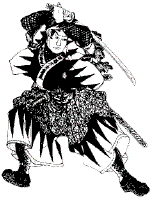|
 |
| The Tengu Institute... Tengu-no-michi.... |
|
 |
|
Created in 1995 by Sensei Habersetzer, the Tengu
Institute is not a CRB-like association but an original field of
research and practice on a classical Budo techniques basis ( as Karatedo,
in particular ), including combat training that brings together
tradition and innovation. This research is conducted inside the C.R.B. (
Budo Reasearch Center ), in a restricted fashion ( see below ), and
never out of that basis, which is considered essential to an appropriate
understanding of its founder’s intentions.
The Tengu Institute must be understood as the logical outcome of the same continuous research Sensei Habersetzer has always pursued in his CRB for more than 25 years. This extension is at the same time natural and sharper. Being called " natural ", it is supposed to be understandable and accessible to any martial artist who is really involved in a dynamic process ( that goes way beyond just a physical and athletic activity), and who is not absolutely bound to any restrictions determined by a style, a school or an expert. The Tengu Institute is the expression of a living Budo practice, evolving from a Tradition in which are kept only deep and true values that stand the test of time and therefore deserve to be understood and transmitted to contemporary and future societies. Among them are respect, effort, tolerance, life, ethics, a process through time… Teaching these human values is the very purpose of the Budo arts as they have been taught for centuries. By calling it "sharper", Habersetzer Sensei is the first to realize that this extension may result in a total misunderstanding or even be utterly rejected, for it is an effort to go beyond simple and comfortable folklore, which does not address the real challenges of our time. One is ready to accept the idea of fighting within the Dojo ( a protected space ), along with play-like behaviors and psychological/philosophical/religious reassuring concepts. But one is worried or shocked by anyone who wants to adapt them to the real world. And yet everybody knows that our contemporary societies, in their always evolving environment, who are faced with forms of violence which are radically different from what they were half a century ago, have to be able to meet their own challenges, not those of Japan and China before the first industrial revolution ! A great majority of Budokas may be ready to admit this in theory, but few are truly ready to follow new directions, away from these paths, well-known and well-kept by those coteries which produce without effort nor responsibility, a discourse defined by the necessity to find new "clients" ( members). That necessity may also be very profitable…During the Tengu Institute trainings ( we speak of "Tengu way" or "Tengu-no-Michi" ), real words are uttered, efficient concepts and appropriate techniques are used in order to deal with an aggressive violence as it may well occur nowadays. Each technique, whether it is empty-hand ( Kara-Ho ), or with a traditional or even modern weapon - for advanced Budokas – ( Buki-Ho: method with weapons), is practiced according to the REAL use of a real WEAPON. That is really the spirit of Tradition: when martial arts were not a topic for sophisticated conversations but were a possible means of survival. Of course, today a majority of citizens are irritated by such a concept, for our societies are pacificist, and yet not peaceful… but this is another story ! However, by giving back the weapon ( hand, foot or any object extending it ) its true dimension of dangerousness and seriousness, the Tengu Way starts a genuine reflexion that leads to the will not to fight, to self-control, and eventually to the extreme limit of the need to survive. This is totally different from competition, sports or games. Tengu-no-Michi is an authentic practice, extremely serious, straining both physically and mentally, and not at all in the air of 2000… Thus, the Tengu Institute in the foundation for a SHIN-BUDO ( "new" Budo ). It integrates without any exclusion techniques and tactical behaviors that have proved efficient in the past centuries, and modern know-how, constantly updated by experiments lived outside the Dojo. Sensei Habersetzer defines his Tengu Way as a realistic way to live a martial art not as a sport but as a reasoned choice to act in the event of a possible confrontation with a real danger for one’s survival. Hence his desire to update the efficiency of any gesture, but always in a dimension where tactical application is in accordance with the moral code that is necessary to any responsible and global approach of an authentic martial practice. At that point, "Tengu-no-Michi" becomes "Hito-no-Michi": the Way of Man… Because of such a "sharp" understanding of the Tengu behavior ( whose false interpretation might lead to an unacceptable drift ), the contents of these techniques can not be developed outside of a restricted circle that includes only Budokas that are both technically qualified in their basic discipline and mentally able to comprehend the implications and the limits of this complementary and more specific training, under the direct authority of Sensei Habersetzer. This training includes techniques called "Integrated System for Personal Defense" (ISPD). As for the correct interpretation of the word "Tengu" itself, it well emphasizes the notion of choice and commitment which should be that of a real Budoka faced with everyday-life challenges, inside and outside of the Dojo. This notion implies, beforehand, a determination, principles, a responsible behavior; and afterwards, to apply these techniques in that same state of mind, adapted according to contemporary reality. Translation : P. Zill |